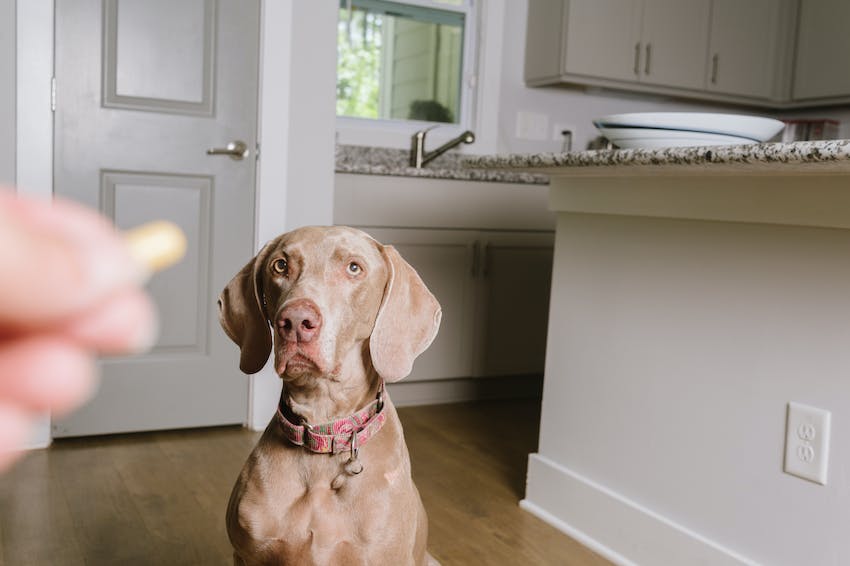Ready to help treat your pet to a healthy life?
Can Dogs Eat Sugar? Truth vs. Myth
By : Trupanion Staff | Updated Oct 15, 2024

If you’ve ever enjoyed a sweet treat, like candy or ice cream, as your dog looked longingly up at you with those big, begging eyes, you know how difficult it can be to resist sharing. It's also no secret that sugar isn't the best treat for pets. But what's actually the truth when it comes to sharing sugar with canines?
There's a common myth that sugar is toxic to dogs. However, this isn't actually the case. Instead, it's other ingredients that are often included in sugary snacks that can be toxic to canines. Simply consuming sugar by itself isn't likely to send your pup into toxic shock.
Does that mean that you should go adding sugary spoonfuls to your pet's bowl? Of course not. As you may have suspected, just because sugar isn't toxic to dogs does not mean it's healthy for them. While it may technically be okay to share some human foods with your pup, you'd be hard-pressed to find any veterinarian who'd recommend giving dogs sugar. This is because the dangers far outweigh the benefits.
Even so, some dogs may be okay consuming small amounts of "safe" sugars for energy. The topic of dogs and sugar is more complex than it seems, so it's best to learn the facts before making any decisions.
What is sugar anyway?
The common perception of "sugar" is the famously sweet-tasting, white and crystallized powdery substance found in most candies, cookies, sodas, and a wide range of other foods and beverages. This only refers to white refined sugar, however. The term "sugar" is actually the generic name for a group of sweet-tasting, easily dissolvable carbohydrates. There are different types of sugar, and while the body (human or canine) processes them all the same way, they can have different effects.
Types of sugar
"Sugar" is an umbrella term. Not all sugars are the same, and some are more harmful to dogs than others.
Monosaccharides
These are simple sugars, which are quickly digested and absorbed into the bloodstream.
- Fructose — naturally occurs in some vegetables and many fruits, which has earned it the name "fruit sugar." Fructose is considered the sweetest of all types of sugar and can be processed into a variety of more potent products, like high-fructose corn syrup. Some kinds of fruits can be eaten safely by dogs, but high levels of fructose should always be carefully avoided.
- Glucose — naturally occurs as a product of photosynthesis in fruits and other plants. Glucose is also naturally present in the blood of mammals and is the main energy source for most animal cells. Irregular levels of glucose in dogs can indicate diabetes or hypoglycemia, which can be extremely dangerous if not treated properly.
- Galactose — usually does not occur by itself but is found along with lactose (a compound sugar). Galactose is considered less sweet than glucose.
Disaccharides
These are compound sugars, which are formed via the combination of multiple monosaccharides. They can take longer to digest than monosaccharides.
- Lactose — naturally occurs in milk. Many dogs are lactose intolerant and cannot consume lactose safely, so it is generally recommended that lactose be avoided in canine diets.
- Maltose — comes from germinated grains, also known as malt (hence the name "maltose"). Maltose occurs naturally in some foods, like honey, and can be consumed safely by dogs in moderation with precautions.
- Sucrose — naturally occurs in many plants alongside glucose and fructose. Sucrose is a prominent in the stems of the sugarcane plant and is the main component of traditional white sugar. While not toxic to dogs, it should be avoided.
Is sugar bad for dogs?
Yes, in a nutshell, sugar is bad for dogs. It is not toxic, but it is a very unhealthy substance that can cause stomach upset, and metabolic changes. If consumed regularly and/or in large enough quantities, sugar can lead to health issues like obesity and diabetes in dogs. Just as with humans, sugary treats for dogs can also lead to dental decay.

Does sugar offer dogs any benefits?
Sugar general does your dog more harm than good, and most versions of it should be avoided at all costs. However, some pet owners tout one benefit to keeping "healthy sugars" on hand for your pup: a sugary treat provides an instant energy boost. This can be beneficial in a variety of situations, including:
- Hunting dogs in the field
- Search-and-rescue dogs during a long expedition
- Police dogs during an intense shift
- Agility dogs right before a trial
Most pets are couch potatoes who enjoy an occasional leisurely stroll. In rare cases, a quick boost is a great way to recharge a high-energy working dog.
Fruit sugars and dogs
Warm cookies straight from the oven on cold days and frosty ice cream on hot days may satisfy humans’ sugar cravings, but processed sugars are not good for dogs. If your pup is begging for a sweet treat, offer them a small piece of fruit instead. You can also try making your own healthy dog treats.
Fruits have fructose, a natural form of sugar. Be sure to keep portions small and don’t overindulge your dog. Fruits that are fine for dogs in moderation include:
- Apples
- Bananas
- Pears
- Watermelon
- Cantaloupe
- Berries
While most fruits can be considered safe sugar sources, never give your dog grapes or raisins. These are toxic to dogs and may even lead to death if enough is consumed. If you're unsure about any fruit, talk with your pet's veterinarian before offering it to your pet.
How dangerous is sugar for dogs?
Sugar’s dangers far outweigh its health benefits for people and pets. Excessive amounts of sugar can cause a host of health problems, such as:
- Obesity
- Diabetes
- Inflammation
- Cavities
- Vomiting
- Diarrhea
- Metabolic changes
- Hyperactivity
People often turn to sugar-free sweeteners, but xylitol, the most common sweetener, is toxic to pets. Xylitol stimulates insulin production, which causes hypoglycemia, or a severe drop in blood sugar. If your dog has snacked on your sugar-free gum, she may exhibit these signs of xylitol toxicity:
- Weakness
- Lack of coordination
- Seizures
- Coma
- Death
Consumption of xylitol can also cause acute liver failure in dogs, which is often fatal.

Safe alternatives to sugar for dogs
The following alternatives to traditional sugar are considered generally safe for dogs in small amounts:
- Honey — Manuka honey is medical-grade honey with antibacterial, antifungal, and antiviral properties. If your pet suffers from environmental allergies, raw, local honey may help.
- Blackstrap molasses — This natural sweetener remains after the sugar’s sucrose crystallizes following the third boiling of sugar syrup. Blackstrap molasses contains key nutrients, including manganese, vitamin B6, selenium, iron, calcium, and potassium.
- Fruits — Fruits contain fructose, a natural sugar, and many important nutrients, such as vitamins, minerals, and antioxidants.
- Maple syrup — This sweetener comes from tree sap and contains a higher concentration of minerals, such as zinc and manganese, but fewer calories than honey. Thanks to a molecule called quebecol, maple syrup reduces inflammation and supports the immune system.
It's always a good idea to talk with your veterinarian before giving your dog any sweet treat or introducing a new item to their diet. Even when your vet does give the go-ahead for an alternative to traditional sugar, don't over-indulge your pet. Many dogs will gladly eat any treats they are offered, so it's up to you as the pet parent to practice moderation and help them maintain a healthy lifestyle.
Learn more about healthy snacks for dogs by checking out what fruits and vegetables are safe for pets.
